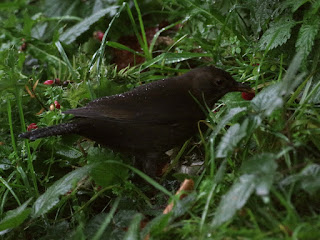On a cold day of steady rain it was a pleasant surprise to see the male Little Owl out on his favourite branch.
His feathers seem quite waterproof, unlike those of the surrounding Feral Pigeons and Ring-Necked Parakeets which were sadly bedraggled.
The Black Swan and his girlfriend were roaming the whole length of the Serpentine, and I really think he wants to take over the whole lake. They didn't need to threaten this adult Mute Swan, which prudently got out of their way.
A Cormorant was carrying a dead leaf across the lake, for no obvious reason. When it accidentally dropped the leaf, it went back and picked it up again.
You don't really think of Cormorants as playful, just determinedly ravenous. But play is characteristic of predators, whose large and nutritious meals give them energy and time to spare.
A few people had turned out to feed the waterfowl at the Lido restaurant. A Greylag Goose was shaking the last crumbs out of a bread bag.
Most of the Egyptian Geese had moved downhill from the Round Pond. Some of them were scrabbling in the dead leaves under the trees. Theoretically they are vegetarians, but the urban population may be becoming omnivorous and appreciate a tasty bug or worm.
A Pied Wagtail was also looking for bugs, running up and down the shore of the Serpentine.
A rain-spattered Shoveller at the Vista was sticking to his usual diet of tiny creatures filtered out of the water.
The rowan trees on Buck Hill had nothing in them but a Magpie. A pair are permanent residents in these trees.
The berries of the yew tree between Peter Pan and the Italian Gardens are running out, and the last ones were being enthusiastically gathered by squirrels. But there are plenty of fallen ones under the tree, and a Blackbird was picking them up.









Do the Black Swan's territorial ambitions know no bounds? The daily drama of your blog has just become that much more intriguing!
ReplyDeleteFor an ambitious swan, bounds are things to expand.
DeleteI wonder if it is a Black Swan's passing resemblance to a rearing snake that gives the unaccustomed Mutes the willies. When a Mute appears who isn't spooked, the game is up. Jim n.L.
DeleteThe swan who won't be spooked is probably on the Long Water at this moment. It will be an interesting encounter -- hope I can see some of it.
DeleteI predict Handbags at Twenty Paces (or the swan equivalent).
ReplyDeleteThe Black swan is introduced species, isn't it? It will be interesting to see how this turns out. In this article, they are described as aggressive. Although this one sounds only aggressive towards other swans on his potential territorial stretch of pond, no the humans. http://www.telegraph.co.uk/news/earth/wildlife/5907318/Australian-black-swan-threat-to-native-cousins.html
ReplyDeleteSince that 2009 article appeared, the rate of spread of Black Swans has slowed and their numbers may even have fallen. Our Black Swan is definitely a park escape rather than part of the new feral population, since he is quite tame and will take biscuits from your hand, and he seems calm around people and I have not seen him pecking a human (other swans are another matter). When he first appeared, I though he would be promptly collected by his 'owners', as happens regularly when, for example, a Bar-Headed Goose strays in from Regent's Park. But so far no one has come to claim him.
Delete